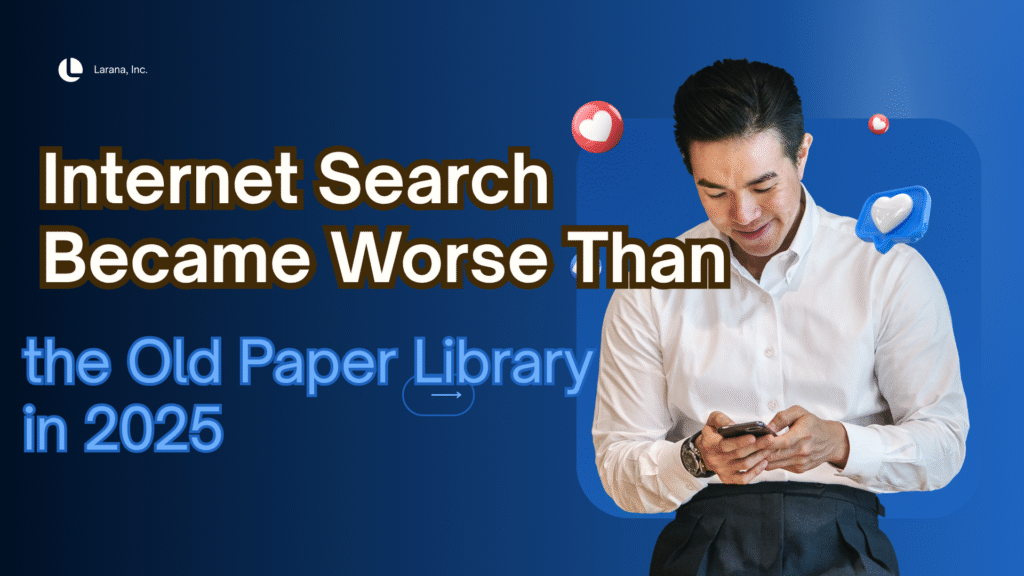|
Getting your Trinity Audio player ready...
|
Since I was a university student in Russia, Internet Search Became Worse Than the Old Paper Library in 2025. I used to spend hours in the dusty reading rooms of paper encyclopedias. It was not a glamorous process, but it worked. In one of those Russian-language encyclopedias, I found clear and concise descriptions of poset filters and proximity spaces. Those concepts inspired me to go further — and eventually, I discovered an entirely new branch of mathematics: the theory of funcoids.
But after I was forced to leave the university due to religious discrimination, I found myself in an unusual position. I had deep mathematical results — yet no scientific degree and therefore no access to the traditional peer-review publishing system. Even publishing my work in parts became nearly impossible.
This led me to a realization that goes beyond my personal story:
The Internet — Our “Smart” Library — Has Become a Blind One
In theory, the Internet was supposed to democratize access to knowledge. But in practice, it has become worse than the old paper library.

In the paper era, once a mathematical concept entered an encyclopedia, it was preserved for generations. Today, the web is dominated by algorithms that bury valuable knowledge under piles of commercial noise. The most important information — like the basic properties of mathematical objects — has become harder, not easier, to find.
If a breakthrough doesn’t appear in peer-reviewed journals or high-ranking websites, search engines effectively erase it from existence. My own research — the next stage of understanding filters and proximity spaces — is not indexed in standard reference sources, not discussed by AI models, and not visible to students who could build upon it.
As a result, the Internet — once imagined as the ultimate open library — now behaves as a closed one.
It amplifies the voices of institutions and corporations, while silencing independent thinkers.
The Current Tech Harm
The harm is subtle but enormous. The most valuable knowledge — the foundational ideas that shape how we understand the world — is disappearing behind layers of SEO optimization, paywalls, and algorithmic filtering.
The next generation of researchers may have faster computers and smarter search tools, yet access to less truth.
The Solution: AI Internet-Meritocracy
I believe there is a way out — through what I call AI Internet-Meritocracy.
It’s not about politics, but about fairness in knowledge. Imagine an AI system that prioritizes value over virality — that amplifies real discoveries instead of trending noise. Such an AI would curate the Internet as a true public good: ranking ideas by their intellectual significance, not their advertising budgets.
AI Internet-Meritocracy would bring back the spirit of the old library — a place where anyone, regardless of institutional affiliation, can access the full spectrum of human thought.
The web must again serve humanity’s quest for truth, not its addiction to distraction.
Ads:
| Description | Action |
|---|---|
|
A Brief History of Time
A landmark volume in science writing exploring cosmology, black holes, and the nature of the universe in accessible language. |
Check Price |
|
Astrophysics for People in a Hurry
Tyson brings the universe down to Earth clearly, with wit and charm, in chapters you can read anytime, anywhere. |
Check Price |
|
Raspberry Pi Starter Kits
Inexpensive computers designed to promote basic computer science education. Buying kits supports this ecosystem. |
View Options |
|
Free as in Freedom: Richard Stallman's Crusade
A detailed history of the free software movement, essential reading for understanding the philosophy behind open source. |
Check Price |
As an Amazon Associate I earn from qualifying purchases resulting from links on this page.


One thought on “Internet Search Became Worse Than the Old Paper Library in 2025”